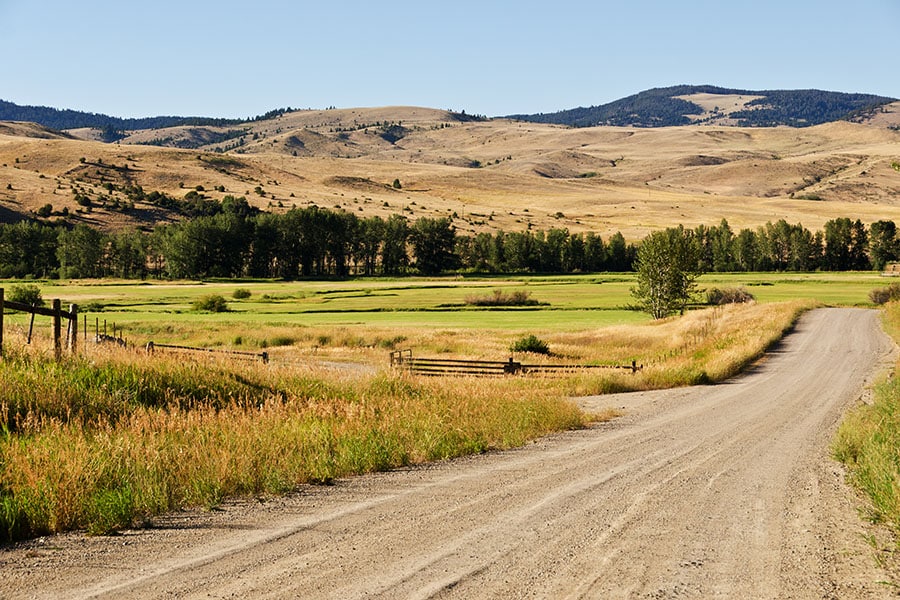When it comes to roadways, most heavily populated areas rely on costly, high-maintenance asphalt roads.
But for more rural areas with a tight infrastructure budget, these expensive materials often lead to more unpaved dirt and gravel roads, which can wreak havoc on the surrounding environment and pose significant safety risks in poor weather conditions.
Thankfully, modern innovation has led to the creation of a new all-weather alternative for gravel and dirt roads that cities of all populations can count on to get their roadways safe and sustainable year-round.
What are the Downsides of Dirt and Gravel Roads?
While unpaved roads are cheap and affordable for all budgets, the reality is that these materials are anything but reliable.
In fact, many complications can be detrimental to the land around your roadway and the drivers themselves.
Here’s why dirt and gravel roads aren’t safe for all weather…
Increased Erosion
Since dirt and gravel roads are made from loose materials, they can be subject to extensive soil erosion that impacts the longevity of your road and harms nearby wildlife.
If your road is near a stream or river, this run-off can find its way into waterways and threaten the stability of the natural ecosystem with every rainfall.
High Flood Risk
Of course, the risks associated with erosion don’t stop with soil run-off.
As dirt roadways deteriorate over time, they can lead to increased flooding during wet months, leading you to perform constant maintenance to keep your road in drivable condition.
If left untreated, these flood-prone areas will slowly form dangerous ditches, potholes, and more bumpy surfaces each year.
Dusty Air Pollution
Rainy weather isn’t the only threat to dirt and gravel roads.
In dry or windy climates, these roadways can send hazardous materials into the air, which land on surrounding vegetation and harm nearby crops.
And for drivers with allergies or respiratory issues, the increase of dust in the air can have a lasting impact on their overall health and well-being, even after just one trip.
What’s the Best All-Weather Alternative to Dirt and Gravel Roads?
Now, here’s the good news:
You don’t have to spend a fortune on concrete paving to improve your roadways.
With cutting-edge geocell technology, you can build a sturdy, durable roadway that stands the test of time, even in the worst weather conditions.
What are BaseCore™ Geocells?
Shaped in a unique honeycomb pattern, geocell systems are a three-dimensional foundation that can be filled with natural materials to create a slope-proof, drainage-friendly alternative to old-school roadways.
Typically made with intricately welded high-density polythene (HDPE), Geocells have been designed to hold up under heavy loads, making them an ideal solution for commercial roadways.
What Makes BaseCore™ Geocells Ideal for All-Weather?
Unlike asphalt, dirt, and gravel, Geocells were made to work with the natural environment, not against it.
With this foundation, you can give your roadways…
Lasting Durability
Premium grade HDPE, used in the manufacturing of our geocells, doesn’t just give you a firm foundation, it prevents cracking or sloping with ultra-durable support that stands up against commercial trucking vehicles, small cars, and everything in between.
On average, geocell foundations last up to 75 years, ensuring that you get the most out of your investment every time.
Minimal Maintenance
Fewer bumps in the road, less money spent on ongoing maintenance.
Geocell bases are simple to install and even easier to care for, allowing you the freedom to minimize your overall costs.
And because geocells come with built-in defense against slope runoff, erosion, ruts and load support, they can save you from needing to add extra safety measures to your roadways over time.
Less Excavation
Installing a high-quality roadway should cause as little disruption to the natural environment as possible.
Geocells provide maximum support at a fraction of the depth of traditional roadway foundations, meaning you can reduce the amount of excavation needed to get your project off the ground.
Best of all, Geocells use flexible infill materials that you can customize to meet the needs of your project, no matter what your budget looks like.
Built-In Drainage
Finally, geocells have become a sought-after all-weather alternative to dirt and gravel roads thanks to the built-in drainage system that reduces flooding and helps keep your residents safe on the road.
Most systems are made with perforated cells that allow excess water to flow between sections and drain out naturally, instead of eroding the surrounding areas.
This helps your road stay secure, even in rainy conditions.
How to Get Started with BaseCore™ Geocells?
Whether you’re starting a new roadway construction project or refurbishing an existing pathway, BaseCore is here to help.
Our elite team of engineers has been leading the charge against outdated construction materials so that we can build a more sustainable transportation system one foundation at a time.
Fill out our simple online contact form to discover the BaseCore™ geocell difference today.
